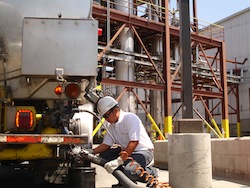 Pearson Fuels is celebrating National Alternative Fuel Vehicle Odyssey Day with ethanol fuel discounts at several stations throughout California. Claire’s Chevron is offering flex-fuel drivers the opportunity to purchase E85 at a significant discount from 8:00 am – 8 pm today, October 22, 2010, at their station located at 680 Commercial Street, San Jose, CA 95112. In addition, Black Diamond Chevron is also participating in the event at their station located at 1001 Willow Pass Court, Concord, CA 94520 as is DB&S Shell at its location at 5551 Martin Luther King Blvd., Sacramento, CA 95820.
Pearson Fuels is celebrating National Alternative Fuel Vehicle Odyssey Day with ethanol fuel discounts at several stations throughout California. Claire’s Chevron is offering flex-fuel drivers the opportunity to purchase E85 at a significant discount from 8:00 am – 8 pm today, October 22, 2010, at their station located at 680 Commercial Street, San Jose, CA 95112. In addition, Black Diamond Chevron is also participating in the event at their station located at 1001 Willow Pass Court, Concord, CA 94520 as is DB&S Shell at its location at 5551 Martin Luther King Blvd., Sacramento, CA 95820.
The event is sponsored by Pearson Fuels which is celebrating its seventh anniversary as the world’s first Alternative Fuel station.
Pearson’s General Manager, Mike Lewis stated, “We know there are literally tens of thousands of flexible fuel vehicle owners in the area that have been burning imported oil in their vehicles for years while a domestically produced, renewable and cleaner burning fuel is available right down the street. We are offering this thank you to our thousands of regular customers to come by and enjoy below cost prices on E85 and car washes as well as free fountain drinks for the day, but just as importantly we want to take away every excuse a person has to not give this fuel a try. If your gas cap is yellow or your gas door says UNLEADED AND E85 FUEL ONLY, you can use this fuel. The manufacturer of your car made it to run on E85, so why burn gasoline?”












